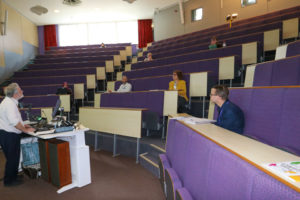Latest news
Investigating the new virus
Written by Gunn Benjaminsen
June 4, 2020
It was the beginning of lockdown in the UK. Schools had closed. Bedrooms became offices and Zoom took the place of meeting rooms. People scrambled to find a new way to live their lives, do their jobs and adapt to an uncertain future. For Dr David Collier and his team, this was a time to think on one’s feet.
Dr Collier is the Clinical Director at the William Harvey Research Institute (WHRI) Clinical Research Centre (CRC) at Barts and the London School of Medicine and Dentistry, part of Queen Mary University of London. For more than two decades, Dr Collier has performed clinical research to find out which treatments are safe and effective for humans – and which ones are not. One of his fields of expertise is hypertension, a well-known condition that has been studied for many decades. Covid-19 is the opposite: A new virus that we still know very little about.
As the world started to grapple with Covid-19, Dr Collier’s boss, Professor Sir Mark Caulfield, Scientific Director of Genomics England and co-Director of WHRI, began working with Professor Kennie Baillie in Edinburgh to create a team that would immerse itself in the genetics and biology of the pandemic. The resulting study, called GenOMICC, and several other UK priority studies would be driven by volunteers. The task: Collect oodles of data from Covid-19 patients and recruit them for trials. The goal: Unveil the secrets of our new and invisible enemy.
Read more about Covid-19, research and how you can help on TrialConnect’s website, where you can also download a research volunteer card.
THE DATA COLLECTORS
In early April, the first batch of specialist volunteers stepped into the Derek Willoughby Lecture Theatre in Charterhouse Square on Queen Mary University of London’s campus in central London. They were nurses with training in research, doctors, scientists, infectious diseases experts, administrators and disaster relief specialists. All of them well placed to recruit patients and collect information on the Covid-19 frontline. Dr Collier led the training of the volunteers on Barts’ campus.
“The lecture theatre can fit more than 200 people, but to comply with social distancing we could only have 30 people there at a time”, Dr Collier said.
 At first glance, this looks like a near-empty lecture theatre. But this is what a full house looks like when people practice social distancing.
At first glance, this looks like a near-empty lecture theatre. But this is what a full house looks like when people practice social distancing.
In total, Dr Collier and his colleagues trained more than 100 volunteers to gather information from patients in the red zones of intensive care units across Barts Health – the new Barts Nightingale Hospital at the Excel Centre, The Royal London, Whipps Cross, Newham and Barts Hospital itself. The volunteers support enrolment and delivery of Covid-19 studies for the benefit of patients. Their tasks are to collect blood samples and demographic details from Covid-19 patients and to enrol some of them in nationally prioritised medical trials to investigate interventions that may help more patients survive.
“We’ve been hugely grateful to volunteers of all kinds who have adapted quickly and helped gain valuable information on Covid-19, across this most diverse of universities and NHS Trusts”, Dr Collier said.
BUILDING A DATA SET FOR RESEARCH
The information the volunteers collect from the patients will create a master data set, which will be a source for Covid-19 research. From the data collected by the volunteers, Sir Mark, Dr Collier and the rest of the team will look for patterns in the way the virus invades a population. This will hopefully give answers we need to tackle Covid-19: Why are the symptoms of Covid-19 so protean? Why do some people shake off the disease in a matter of days, while others go into respiratory failure? Why are men more likely to experience severe Covid-19 than women? Why are Black, Asian and Minority Ethnic (BAME) groups in the UK up to three times as likely to die from Covid-19 than the general population?
The data that is being collected could be a golden opportunity to understand the new virus – and give us clues for how to stamp it out.
HYPERTENSION, MOUNT EVEREST, A PANDEMIC
Dr Collier has dedicated his long career to clinical research. He has been with the CRC since its start in 1997. In the early 2000s, he ran the Anglo-Scandinavian Cardiac Outcome Trial (ASCOT) team, which recruited 1,157 patients – a national record for such a trial. ASCOT became a landmark trial and triggered joint NICE/NHS guidelines for hypertension. Dr Collier has also focused on high altitude mountaineers: He has researched the British Mount Everest Medical Expedition climbers and their ability to survive and thrive on very low levels of oxygen. This research may prove to be useful to understand the impact of Covid-19 on the human body and its response to low oxygen levels.
Covid-19 took most of us by surprise. But Dr Collier can rely on facts and figures when he states that a pandemic was on the cards.
“Statistically, a pandemic was overdue”, Dr Collier says.
Perhaps only coincidences and a bit of luck are the reasons why the world hasn’t seen anything like Covid-19 in recent memory. In 2002-04, we probably had a lucky escape with SARS.
Photo: TrialsConnect and Adobe Stock

